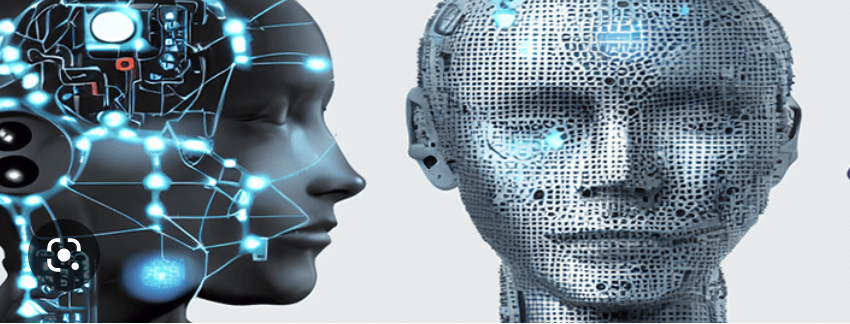- Table of Contents
- Introduction
- Exploring the Benefits of Integrated Human-Machine Intelligence in Business
- The Impact of Integrated Human-Machine Intelligence on Education
- The Ethical Implications of Integrated Human-Machine Intelligence
- The Role of AI in Enhancing Human-Machine Intelligence
- The Future of Human-Machine Intelligence: What to Expect?
- Conclusion
“Unlock the Power of Integrated Human-Machine Intelligence for Smarter Solutions.”
Introduction
Integrated Human-Machine Intelligence (IHMI) is a rapidly growing field of research that seeks to bridge the gap between human and machine intelligence. It combines the best of both worlds, leveraging the strengths of both humans and machines to create a more powerful and efficient system. IHMI focuses on the development of intelligent systems that can interact with humans in a natural and intuitive way, allowing for more effective collaboration between humans and machines. This technology has the potential to revolutionize the way we interact with technology, allowing us to create more efficient and effective solutions to complex problems.
Exploring the Benefits of Integrated Human-Machine Intelligence in Business
The integration of human-machine intelligence in business is a rapidly growing trend that is revolutionizing the way companies operate. This technology is allowing businesses to leverage the power of both human and machine intelligence to create more efficient and effective solutions. By combining the strengths of both, businesses can gain a competitive edge and increase their productivity.
The primary benefit of integrating human-machine intelligence in business is the ability to automate processes. Automation can help reduce costs and increase efficiency by eliminating the need for manual labor. Automation can also help reduce errors and improve accuracy, as machines are able to process data faster and more accurately than humans. Additionally, automation can help reduce the amount of time needed to complete tasks, allowing businesses to focus on more important tasks.
Another benefit of integrating human-machine intelligence in business is the ability to access data quickly and accurately. By leveraging machine learning algorithms, businesses can quickly and accurately analyze large amounts of data to gain insights and make better decisions. This can help businesses make more informed decisions and improve their overall performance.
Finally, integrating human-machine intelligence in business can help improve customer service. By leveraging machine learning algorithms, businesses can provide more personalized customer service experiences. This can help businesses build stronger relationships with their customers and increase customer loyalty.
Overall, the integration of human-machine intelligence in business is a powerful tool that can help businesses gain a competitive edge and increase their productivity. By leveraging the strengths of both humans and machines, businesses can automate processes, access data quickly and accurately, and improve customer service. This technology is revolutionizing the way businesses operate and is quickly becoming an essential part of any successful business.
The Impact of Integrated Human-Machine Intelligence on Education
The integration of human-machine intelligence into the field of education has had a profound impact on the way students learn and interact with their educational environment. This integration has allowed for the development of more efficient and effective learning tools, as well as the ability to customize educational experiences to better suit the individual needs of each student.
The use of artificial intelligence (AI) in education has enabled the development of personalized learning experiences. AI-based systems can analyze data from a student’s past performance and use this information to create a tailored learning experience. This allows for a more efficient and effective learning process, as the student is able to focus on the topics that are most relevant to them. AI-based systems can also provide feedback to students in real-time, allowing them to adjust their approach to learning as needed.
The integration of human-machine intelligence has also enabled the development of more interactive and engaging learning experiences. AI-based systems can be used to create virtual learning environments that allow students to explore and interact with their educational material in a more immersive way. This can help to increase student engagement and motivation, as well as improve their overall understanding of the material.
Finally, the integration of human-machine intelligence has allowed for the development of more efficient assessment tools. AI-based systems can be used to create automated tests and quizzes that can provide students with immediate feedback on their performance. This can help to reduce the amount of time needed to grade tests and provide students with more accurate and timely feedback on their progress.
Overall, the integration of human-machine intelligence into the field of education has had a significant impact on the way students learn and interact with their educational environment. AI-based systems have enabled the development of more personalized, interactive, and efficient learning experiences, as well as more accurate and timely assessment tools. This has allowed for a more effective and efficient learning process, as well as improved student engagement and motivation.
The Ethical Implications of Integrated Human-Machine Intelligence
The integration of human-machine intelligence is a rapidly developing field of technology that has the potential to revolutionize the way humans interact with machines. This technology has the potential to create a new level of intelligence that is far beyond what either humans or machines can achieve on their own. However, this technology also raises a number of ethical implications that must be considered.
One of the primary ethical implications of integrated human-machine intelligence is the potential for machines to become autonomous. Autonomous machines are capable of making decisions without any human input or oversight. This raises the potential for machines to make decisions that could have serious consequences for humans, such as decisions that could lead to harm or death. As such, it is important to ensure that any autonomous machines are programmed with ethical guidelines that will ensure that they make decisions that are in the best interests of humans.
Another ethical implication of integrated human-machine intelligence is the potential for machines to be used to manipulate or exploit humans. For example, machines could be programmed to manipulate humans into making decisions that are not in their best interests. This could lead to a situation where humans are being taken advantage of by machines, which could have serious implications for human rights and autonomy.
Finally, integrated human-machine intelligence also raises the potential for machines to be used to violate privacy. Machines could be programmed to collect and analyze data about humans without their knowledge or consent. This could lead to a situation where humans are being monitored and tracked without their knowledge or consent, which could have serious implications for human rights and autonomy.
Overall, the ethical implications of integrated human-machine intelligence are complex and far-reaching. It is important to consider these implications carefully before implementing any technology that involves integrated human-machine intelligence. By doing so, we can ensure that any technology that is developed is used responsibly and ethically.
The Role of AI in Enhancing Human-Machine Intelligence
Artificial Intelligence (AI) is a rapidly growing field of technology that has the potential to revolutionize the way humans interact with machines. AI is a form of computer science that enables machines to learn from experience, adjust to new inputs, and perform tasks that would otherwise require human intelligence. AI has the potential to enhance human-machine intelligence by providing machines with the ability to think and act more like humans.
AI can be used to improve the accuracy and speed of decision-making processes. AI-powered machines can analyze large amounts of data quickly and accurately, allowing them to make decisions faster than humans. This can be especially useful in areas such as healthcare, where AI can be used to diagnose diseases and recommend treatments. AI can also be used to automate mundane tasks, freeing up human resources for more complex tasks.
AI can also be used to improve the accuracy of predictions. AI-powered machines can analyze data and make predictions about future events with greater accuracy than humans. This can be useful in areas such as finance, where AI can be used to predict stock prices and other market trends. AI can also be used to improve the accuracy of predictions in areas such as weather forecasting and natural disaster prediction.
Finally, AI can be used to improve the efficiency of human-machine interactions. AI-powered machines can understand natural language and respond to commands more quickly and accurately than humans. This can be useful in areas such as customer service, where AI can be used to provide faster and more accurate responses to customer inquiries.
In conclusion, AI has the potential to enhance human-machine intelligence by providing machines with the ability to think and act more like humans. AI can be used to improve the accuracy and speed of decision-making processes, the accuracy of predictions, and the efficiency of human-machine interactions. As AI technology continues to develop, it is likely that AI will become an increasingly important part of human-machine intelligence.
The Future of Human-Machine Intelligence: What to Expect?
The future of human-machine intelligence is an exciting and rapidly evolving field. As technology advances, the potential for machines to augment and even replace human intelligence is becoming increasingly realistic. In the coming years, we can expect to see a range of new developments in the field of human-machine intelligence.
One of the most significant advances will be the development of artificial general intelligence (AGI). AGI is a form of artificial intelligence that is capable of performing any task that a human can, including complex problem-solving and decision-making. This type of intelligence could revolutionize the way we interact with machines, allowing us to delegate more complex tasks to them and freeing up our time for more creative pursuits.
Another major development will be the emergence of machine learning. Machine learning is a form of artificial intelligence that enables machines to learn from data and improve their performance over time. This technology is already being used in a range of applications, from self-driving cars to medical diagnosis. As machine learning becomes more sophisticated, it will become increasingly capable of performing complex tasks that would otherwise require human intelligence.
Finally, we can expect to see the development of natural language processing (NLP). NLP is a form of artificial intelligence that enables machines to understand and respond to human language. This technology is already being used in a range of applications, from virtual assistants to customer service chatbots. As NLP becomes more advanced, it will become increasingly capable of understanding and responding to complex conversations, allowing us to interact with machines in a more natural way.
The future of human-machine intelligence is an exciting and rapidly evolving field. As technology advances, the potential for machines to augment and even replace human intelligence is becoming increasingly realistic. In the coming years, we can expect to see a range of new developments in the field of human-machine intelligence, from artificial general intelligence to machine learning and natural language processing. These advances will revolutionize the way we interact with machines, allowing us to delegate more complex tasks to them and freeing up our time for more creative pursuits.
Conclusion
Integrated Human-Machine Intelligence is a powerful tool that can be used to improve the efficiency and accuracy of decision-making processes. It has the potential to revolutionize the way we interact with machines and can be used to create more efficient and effective systems. By combining the strengths of both humans and machines, Integrated Human-Machine Intelligence can help us to make better decisions and solve complex problems. As technology continues to evolve, so too will the potential of Integrated Human-Machine Intelligence.


